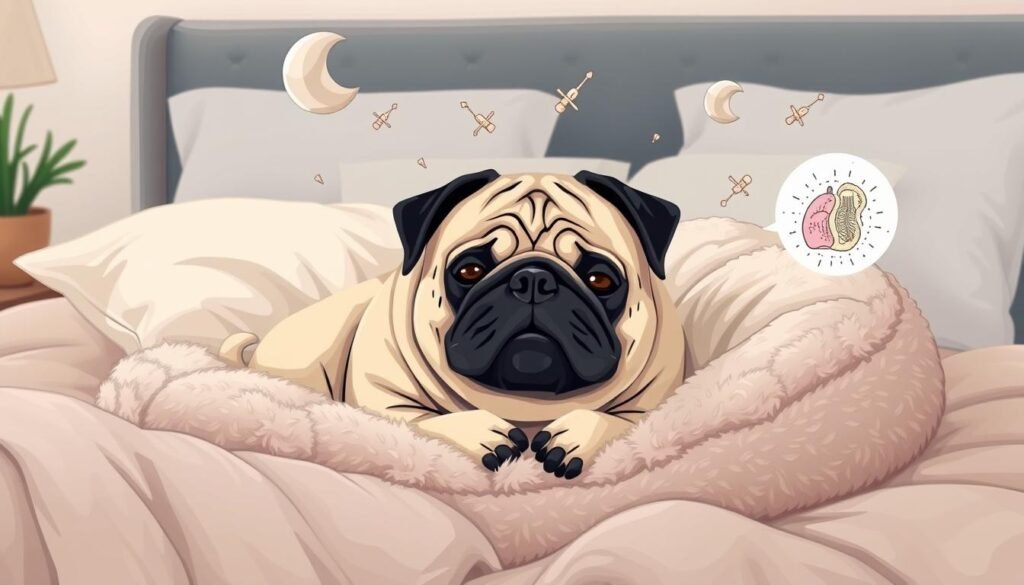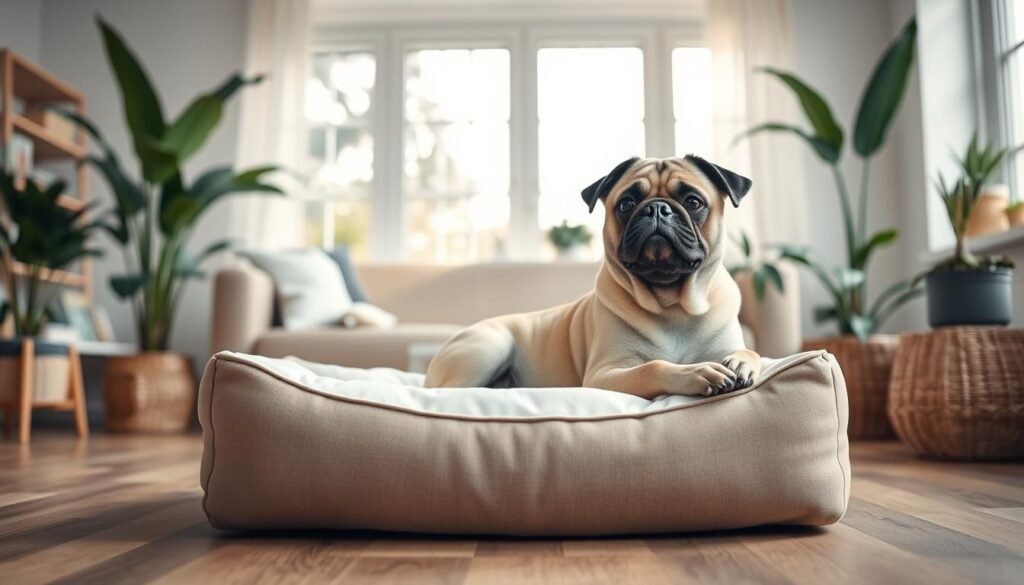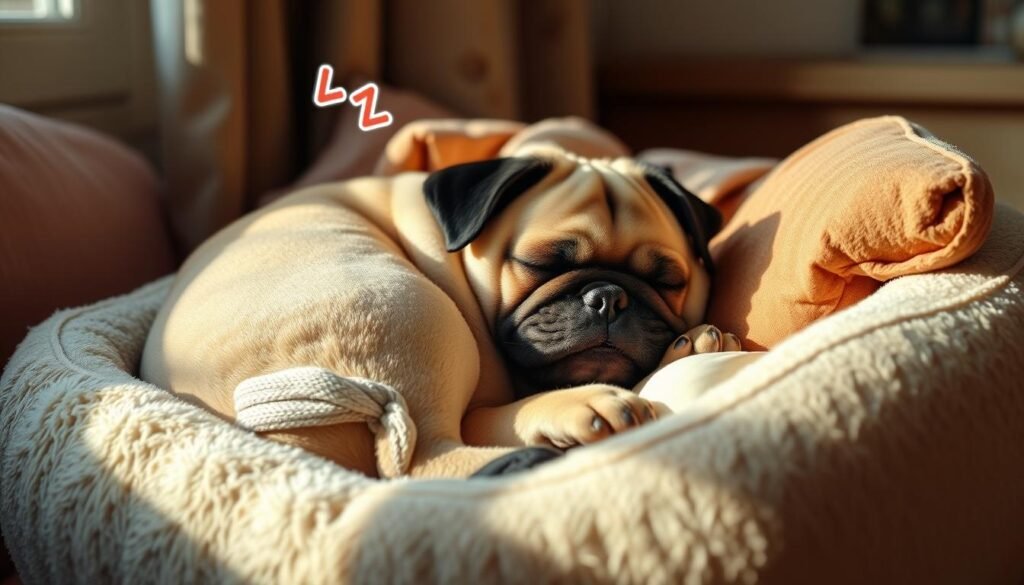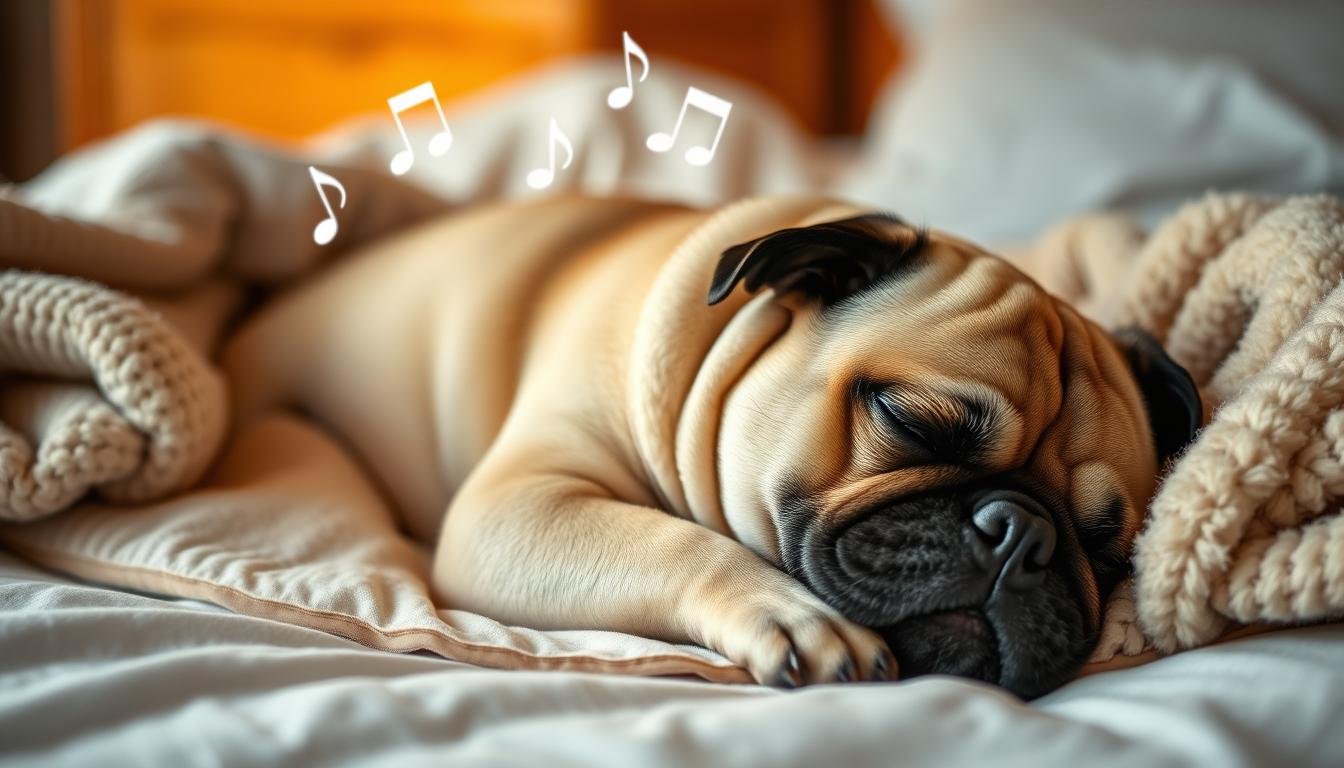How to avoid excessive snoring in Pugs
Did you know that 75% of brachycephalic dog breeds, like Pugs, are prone to snoring? This is because their short nasal passages cause breathing problems and snoring. As a Pug owner, it’s important to tackle the reasons behind your pet’s snoring to better their health and happiness.
Pugs have a unique look with a short skull and flat face. This can lead to breathing issues like snoring, loud breathing, and sleep apnea. Knowing why Pugs snore is key to finding ways to help them breathe better and sleep more soundly.
Understanding Pug Snoring
Pugs are loved for their cute, wrinkly faces. But their unique shape can cause a common problem – snoring. Their short skulls and squished faces make them prone to snoring.
Brachycephalic Breed Anatomy
Pugs’ short skulls lead to breathing troubles and snoring. Their long soft palates, small nasal passages, and narrow airways are to blame. These features make Pugs more likely to snore, even when they’re awake.
Pugs, along with other brachycephalic breeds like Boston Terriers, Bulldogs, and French Bulldogs, are prone to respiratory problems that can lead to excessive snoring.
Knowing about pug nasal and airway structure helps solve snoring issues. Pet owners can work with vets to find ways to help their Pugs breathe and sleep better.

“Snoring in Pugs is often caused by stenotic nares and an elongated soft palate, which can be addressed through surgical procedures like wedge alar rhinoplasty and staphylectomy.”
Obesity and Weight Management
Keeping your Pug at a healthy weight is key to less snoring. Obesity is common in Pugs and can block airflow. This extra fat, especially around the neck, makes breathing hard during sleep.
To keep your Pug healthy, a balanced diet and regular exercise are crucial. Watch how much food your Pug eats to manage their weight. Daily walks or playtime can also keep them fit and healthy. This helps reduce obesity and snoring.
Talking to your vet is a smart move to find the right weight for your Pug. Small changes in diet and exercise can greatly improve your Pug’s health. This can also cut down on snoring.
“Overweight or obese pets may snore more due to extra fat in the throat area blocking airflow during sleep.”

Environmental Factors
The place where your Pug sleeps can really affect their snoring. Bad air quality, like dust, pollen, or smoke, can make them snore more. It’s important to make sure their sleeping area is clean and well-ventilated.
Air Quality and Allergens
Pugs, being brachycephalic, are more likely to be affected by their environment. Things like dust, pet dander, or chemicals can make it hard for them to breathe. By keeping these allergens away, you can help your Pug sleep better.
- Use air purifiers, open windows, and clean often to keep the air good in your Pug’s sleeping area.
- Keep your Pug indoors when pollen is high to avoid breathing in allergens.
- Choose hypoallergenic bedding and wash your Pug’s sleeping area often to cut down on dust and dander.
By making your Pug’s sleeping area clean and well-ventilated, you can help them breathe better. This can also reduce their snoring.

“Creating a comfortable, allergen-free sleeping environment for your Pug can make a significant difference in their snoring and overall respiratory health.”
How to avoid excessive snoring in Pugs
Pugs are adorable, but their flat faces can cause snoring. This can disrupt their sleep and may lead to health issues. Luckily, there are ways to reduce pug snoring and keep them comfortable.
Obesity is a big factor in pug snoring. Extra weight narrows airways and blocks breathing. Keeping your pug at a healthy weight through diet and exercise can help a lot.
- Adopt a weight-loss plan tailored to your pug’s needs, consulting with your veterinarian to ensure safe and effective results.
- Incorporate daily walks or playtime to help your pug stay active and trim.
Environmental factors like air quality and allergens can also cause snoring. A clean, well-ventilated sleeping area and a humidifier can help.
“Controlling air pollution in the household, such as avoiding smoking around dogs, can reduce snoring.”
Also, treating any allergies your pug has can improve their breathing and snoring.
Try changing your pug’s sleeping position and using anti-snoring pillows or raised bedding. This can help open their airways and reduce snoring.
If your pug’s snoring gets worse or is very loud, see your vet. They can check for health issues that might be causing the snoring.
Sleeping Position and Accessories
The way your pug sleeps can really affect their snoring. If you make them sleep with their head up, like on a pillow, it can help. This keeps their airways open and cuts down on snoring.
There are also special accessories for pugs to help with snoring. These include snoring collars, nasal dilators, and more. They help keep the airway open, which reduces the vibrations that cause snoring.
- Snoring Collars: These collars gently lift the dog’s chin. This keeps the airway open and lowers snoring.
- Nasal Dilators: These small devices expand the dog’s nostrils. This improves airflow and cuts down on snoring.
- Elevated Beds: Raising your pug’s bed helps prevent their tongue and soft palate from blocking their airway while they sleep.
When picking out anti-snoring accessories for your pug, make sure they’re made for their breed. Always talk to your vet to make sure they’re safe and work well. By changing your pug’s sleeping position and using the right accessories, you can lessen their snoring. This will help both of you sleep better.

“Providing your pug with a comfortable, elevated sleeping surface and using anti-snoring accessories can make a significant difference in reducing their snoring.”
Seeking Veterinary Assistance
If your Pug’s snoring is constant, loud, or comes with breathing trouble, get vet help. A vet can find out why your Pug is snoring so much and suggest treatments.
The vet might suggest medicines, changes in your Pug’s life, or surgery in some cases. Finding and fixing the snoring cause early can make your Pug healthier and happier. If you worry about your Pug’s snoring, book a vet visit.
Changes in your Pug’s snoring might mean they have a serious health issue. This could be a lung infection, tooth problem, or blockage in their airway. Quick vet care is key to help your Pug feel better and stay healthy.

